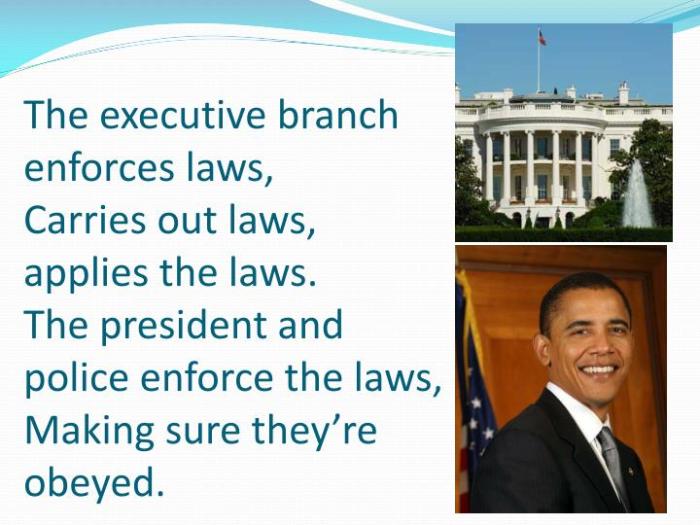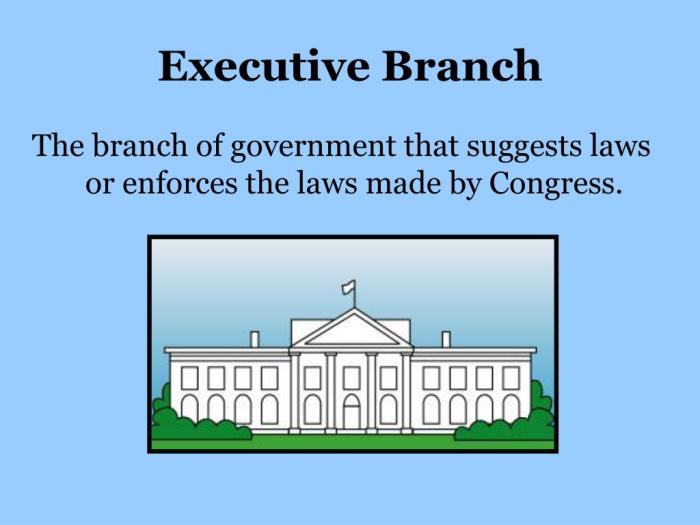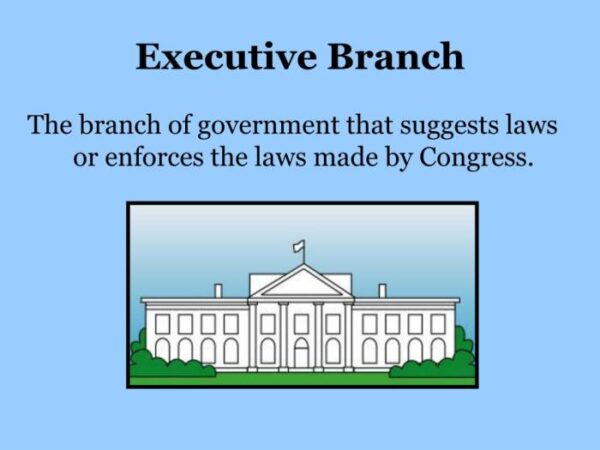
Which branch enforces laws? This fundamental question lies at the heart of any democratic society, shaping the very fabric of our legal system. Understanding how the branches of government interact to uphold the law is crucial to ensuring a just and equitable society.
The United States, with its system of checks and balances, divides governmental power among three branches: the executive, legislative, and judicial. Each branch plays a distinct role in the lawmaking and enforcement process, ensuring no single entity holds absolute authority.
The Role of the Executive Branch

The executive branch, led by the President of the United States, plays a crucial role in enforcing the laws passed by Congress. This branch is responsible for implementing and administering the laws, ensuring they are effectively carried out across the nation.
The President’s Role in Enforcing Laws
The President has broad authority to enforce laws through various means, including executive orders and regulations. These actions are often used to clarify or expand upon existing laws, address specific issues, or implement new policies.
Executive Orders
Executive orders are directives issued by the President that have the force of law within the executive branch. They are used to direct federal agencies to take specific actions or implement policies. For example, President Biden issued Executive Order 14008, “Tackling the Climate Crisis at Home and Abroad,” which directed federal agencies to address climate change through various initiatives.
Regulations
Federal agencies, under the direction of the President, have the authority to create regulations that further define and implement laws passed by Congress. These regulations provide specific details on how laws should be applied in practice. For instance, the Environmental Protection Agency (EPA) has issued regulations under the Clean Air Act to limit air pollution from vehicles and industrial facilities.
Specific Instances of Presidential Enforcement of Laws
The President has historically used executive power to enforce laws in various situations. For example, President Truman desegregated the armed forces through Executive Order 9981 in 1948, despite facing significant opposition. Similarly, President Obama used executive orders to implement the Affordable Care Act, expanding access to healthcare for millions of Americans.
The Role of the Legislative Branch

The legislative branch of the United States government, composed of Congress, plays a crucial role in shaping and enforcing the law. Congress is responsible for creating and amending laws, and its powers extend to influencing how those laws are implemented and enforced.
Powers of Congress Related to Law Enforcement, Which branch enforces laws
Congress’s power to enact laws directly impacts law enforcement. The Constitution grants Congress the authority to establish federal crimes and penalties, ensuring a consistent legal framework across the nation. This includes defining offenses like treason, piracy, counterfeiting, and crimes against the United States.
Congressional Oversight and Funding
Congress exercises significant influence over law enforcement through oversight and funding. Oversight mechanisms allow Congress to scrutinize the executive branch’s actions in implementing laws, ensuring accountability and transparency. This oversight can take various forms, including:
- Congressional hearings: These hearings provide a platform for lawmakers to question executive branch officials, including law enforcement agencies, about their operations and policies. This scrutiny helps ensure that laws are enforced effectively and fairly.
- Investigations: Congress can initiate investigations into potential wrongdoing by law enforcement agencies, ensuring that laws are upheld and abuses are addressed.
- Legislative proposals: Congress can propose legislation to strengthen or amend existing laws based on oversight findings. This can lead to improved law enforcement practices and policies.
Congress also plays a vital role in funding law enforcement agencies. By allocating funds through the appropriations process, Congress can influence the priorities and resources available to law enforcement. This includes funding for:
- Personnel: Salaries and benefits for law enforcement officers.
- Equipment: Vehicles, weapons, and technology for law enforcement operations.
- Training: Programs to enhance the skills and knowledge of law enforcement officers.
By controlling the purse strings, Congress can encourage law enforcement agencies to focus on specific areas of concern or prioritize certain enforcement strategies. This funding power serves as a crucial tool for shaping the direction and effectiveness of law enforcement.
The Role of the Judicial Branch

The Judicial Branch, comprised of the courts, plays a crucial role in the American system of government. It serves as the interpreter and enforcer of the laws passed by the Legislative Branch and executed by the Executive Branch.
Interpreting and Applying Laws
The courts are responsible for determining the meaning and application of laws in specific cases. This involves analyzing the language of the law, considering its legislative history, and examining its intended purpose. The courts also consider precedents, which are prior judicial decisions that establish legal principles. This process of interpreting and applying laws ensures that the law is applied fairly and consistently across different cases.
The Structure of the Federal Court System
The United States has a dual court system, with both federal and state courts. The federal court system is structured as follows:
* The Supreme Court: The highest court in the federal court system, the Supreme Court has final authority on all legal matters.
* Federal Courts of Appeal: These courts review decisions made by lower federal courts.
* Federal District Courts: These are the trial courts of the federal court system.
The Role of the Courts in Law Enforcement
The role of the courts in law enforcement is to ensure that the law is applied fairly and consistently. This involves:
* Adjudicating criminal cases: The courts determine whether a defendant is guilty or not guilty of a crime.
* Resolving civil disputes: The courts resolve disputes between individuals, businesses, or governments.
* Interpreting and applying laws: The courts determine the meaning and application of laws in specific cases.
Judicial Review
Judicial review is the power of the courts to review laws and actions of the government to determine if they are constitutional. This power is not explicitly mentioned in the Constitution, but it was established by the Supreme Court in the case of *Marbury v. Madison* (1803). The Supreme Court has used its power of judicial review to invalidate laws, strike down executive actions, and shape the course of American law.
Impact of Judicial Review on Law Enforcement
Judicial review has a significant impact on law enforcement. It ensures that the government operates within the limits of the Constitution and that laws are applied fairly and consistently. For example, the Supreme Court has used judicial review to strike down laws that were discriminatory or violated individual rights.
Comparing the Roles of the Supreme Court, Federal Courts, and State Courts
The following table compares the roles of the Supreme Court, federal courts, and state courts in law enforcement:
| Court | Role |
|—|—|
| Supreme Court | The highest court in the federal court system. Has final authority on all legal matters. |
| Federal Courts of Appeal | Review decisions made by lower federal courts. |
| Federal District Courts | Trial courts of the federal court system. |
| State Supreme Courts | The highest court in each state. Has final authority on all legal matters in the state. |
| State Courts of Appeal | Review decisions made by lower state courts. |
| State Trial Courts | Trial courts of the state court system. |
Law Enforcement Agencies
Law enforcement agencies play a vital role in ensuring the safety and security of citizens and upholding the rule of law. These agencies are responsible for enforcing laws, investigating crimes, and maintaining order within their jurisdictions. They operate at various levels, including federal, state, and local, each with its own specific responsibilities and areas of expertise.
Federal Law Enforcement Agencies
The federal government has a number of agencies responsible for enforcing laws that apply nationwide. These agencies have broad jurisdiction and often focus on crimes that cross state lines or involve national security.
- Federal Bureau of Investigation (FBI): The FBI is the primary investigative arm of the U.S. Department of Justice. Its responsibilities include investigating a wide range of federal crimes, such as terrorism, cybercrime, organized crime, and white-collar crime. The FBI also provides support to state and local law enforcement agencies through its National Crime Information Center (NCIC) and other resources.
- Drug Enforcement Administration (DEA): The DEA is responsible for combating drug trafficking and abuse. Its primary mission is to enforce the Controlled Substances Act, which regulates the manufacture, distribution, and use of controlled substances. The DEA works closely with other law enforcement agencies, both domestically and internationally, to disrupt drug trafficking networks.
- Bureau of Alcohol, Tobacco, Firearms and Explosives (ATF): The ATF enforces federal laws related to firearms, explosives, and alcohol and tobacco. Its responsibilities include investigating illegal firearms trafficking, bomb threats, and arson cases. The ATF also works with state and local agencies to provide training and technical assistance.
- U.S. Marshals Service: The U.S. Marshals Service is the oldest federal law enforcement agency. Its responsibilities include protecting federal judges and witnesses, apprehending fugitives, and managing federal properties. The Marshals Service also plays a key role in transporting prisoners and executing court orders.
- U.S. Secret Service: The Secret Service is responsible for protecting the President, Vice President, and their families, as well as other high-ranking government officials. It also investigates counterfeiting and financial crimes. The Secret Service has a long history of protecting the nation’s financial infrastructure and combating financial fraud.
- Department of Homeland Security (DHS): DHS is a large and complex agency with a broad mandate to protect the nation from terrorism and other threats. Its components include U.S. Customs and Border Protection (CBP), U.S. Immigration and Customs Enforcement (ICE), U.S. Citizenship and Immigration Services (USCIS), and the Transportation Security Administration (TSA). These agencies work together to secure the nation’s borders, enforce immigration laws, and protect critical infrastructure.
State and Local Law Enforcement Agencies
State and local law enforcement agencies are responsible for enforcing state and local laws within their jurisdictions. They are often the first responders to crimes and emergencies, and they play a critical role in maintaining order and safety within their communities.
| Agency | Responsibilities |
|---|---|
| State Police or Highway Patrol | Enforcing state traffic laws, investigating major crimes, providing support to local law enforcement agencies |
| County Sheriff’s Office | Enforcing county laws, operating the county jail, serving warrants, providing court security |
| Municipal Police Department | Enforcing city ordinances, responding to calls for service, investigating crimes, providing traffic control |
Collaboration and Coordination
Law enforcement agencies at all levels work together to ensure the effective enforcement of laws and the protection of citizens. Collaboration and coordination are essential for sharing information, resources, and expertise. This collaboration can take many forms, such as:
- Joint Task Forces: Federal, state, and local agencies often work together on joint task forces to investigate complex crimes or address specific threats. For example, task forces might be formed to investigate drug trafficking, terrorism, or cybercrime.
- Information Sharing: Law enforcement agencies share information about crimes, suspects, and other relevant data through databases and communication channels. This allows agencies to track criminal activity, identify trends, and develop effective strategies for prevention and enforcement.
- Training and Resources: Federal agencies often provide training and resources to state and local agencies to enhance their capabilities and improve their ability to enforce laws effectively.
Challenges to Law Enforcement
Law enforcement agencies face numerous challenges in effectively enforcing laws and maintaining public safety. These challenges are often complex and multifaceted, stemming from societal issues, resource limitations, and evolving criminal tactics. Understanding these challenges is crucial for improving law enforcement practices and ensuring justice for all.
Impact of Public Opinion and Political Pressure
Public opinion and political pressure can significantly influence law enforcement practices. The public’s perception of law enforcement can vary widely, often influenced by media portrayals, personal experiences, and societal trends. This perception can impact public trust in law enforcement and influence the level of cooperation with officers.
For example, public opinion on issues such as racial profiling, police brutality, and excessive use of force can lead to increased scrutiny and accountability for law enforcement agencies. Political pressure from elected officials can also shape law enforcement priorities and resource allocation.
“The public’s perception of law enforcement can vary widely, often influenced by media portrayals, personal experiences, and societal trends.”
Different Approaches to Law Enforcement
Law enforcement approaches vary significantly across jurisdictions, influenced by factors such as cultural norms, crime rates, and political ideologies. Some jurisdictions prioritize a community-oriented policing approach, emphasizing collaboration with the community and building trust. Others may focus on a more traditional law enforcement model, emphasizing strict enforcement of laws and a strong presence in high-crime areas.
For example, in some countries, law enforcement agencies may adopt a more militaristic approach, with a focus on maintaining order and control through force. In contrast, other jurisdictions may prioritize restorative justice practices, aiming to address the underlying causes of crime and rehabilitate offenders.
“Law enforcement approaches vary significantly across jurisdictions, influenced by factors such as cultural norms, crime rates, and political ideologies.”
Final Wrap-Up: Which Branch Enforces Laws
The intricate interplay between the executive, legislative, and judicial branches ensures that laws are created, enforced, and interpreted in a balanced and accountable manner. This delicate equilibrium safeguards individual rights, promotes fairness, and ultimately defines the very essence of our legal system.
Expert Answers
What is the role of the President in enforcing laws?
The President, as head of the executive branch, is responsible for enforcing laws passed by Congress. This includes issuing executive orders, appointing federal judges, and overseeing federal agencies.
How does the judicial branch enforce laws?
The judicial branch enforces laws by interpreting them and applying them to specific cases. The courts determine whether laws are constitutional and ensure that they are applied fairly and consistently.
What are some examples of law enforcement agencies?
Federal law enforcement agencies include the FBI, DEA, and ATF. State and local law enforcement agencies include police departments, sheriff’s offices, and state troopers.





